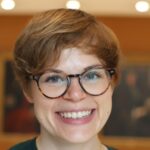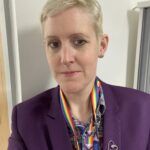Welcome to this first blog in the series “We need to talk about professionalism”, where we will explore the ways in which professionalism governs the acceptance of marginalised people within healthcare careers. Co-authored with Dr Jo Hartland (they/them) and guest authors, we will explore key concepts that will illustrate this issue. We hope this prompts readers, especially those in healthcare leadership, to consider; is inclusion enough? Or is the performance of professionalism creating a culture of active exclusion for marginalised people? Though the ‘inclusion’ agenda appears to be gaining momentum, we question whether there is actually increasing celebration of diversity or whether ‘inclusion’ implies regression to the norm. In this first blog, Dr Susannah Brockbank (she/her) and Professor Viktoria Goddard (they/them) share the findings of a PhD thesis which explores the way in which unwritten rules of professional behaviour and social capital dictate the extent to which undergraduate students are seen as ‘professional’.
SB’s PhD began with the intention of creating a process template to help remediate unprofessional behaviour in medical students. Unprofessional behaviour is described in the medical education literature as a significant problem, associated with misconduct in clinical practice (Papadakis et al., 2004), poor communication and patient safety concerns (Arnold, Sullivan & Quaintance , 2016). With this in mind, it seems vital to identify and address unprofessional behaviour early and effectively. In order to begin this process, SB set out to understand the experience of supposedly unprofessional students and their identities (Brockbank, 2021). Participants in this research told stories of their socioeconomic and cultural backgrounds that set them apart from their peers. These differences seemed to cause them difficulty with performing the role of a medical student in a way that felt comfortable to them but also met the implied standards of those assessing their professionalism. SB reflects that:
“In the process of seeking these insights, I discovered something quite unexpected: the participants interviewed all felt ‘other’. None of them felt entirely at ease with their role as a medical student. This led me to interrogate my own interpretations of professional and unprofessional behaviour. I was forced to consider my own positionality and to reflect, often uncomfortably, on the many times my actions had fallen short of the supposed optimal professional standard. Acknowledging this I then had to ask: why had my own performance of professionalism never been called into question?“
In short, there seemed to be barriers to professionalism that SB had never encountered as a straight, white woman from an upper middle class home and a selective secondary school. This chimed with VG’s (as SB’s supervisor) experience that some students appeared more likely to be referred to their medical school for professionalism concerns than others. Echoed in GMC data that suggests that post- graduation, certain groups of doctors are over-represented in Fitness to Practice referrals (GMC 2019). This led us to ask: why is the performance of professionalism (Goffman, 1956) more difficult for some medical students than others? We started to discuss the premise that the current definitions of professionalism are outdated and reliant upon entrenched concepts of social and economic privilege which should no longer hold power over our increasingly diverse workforce.
Many extant definitions of professionalism rely on the idea of an invisible and unwritten ‘contract’ between medicine as a profession and the public (Cruess & Cruess, 2020). This social contract supposedly dictates that doctors should behave in a particular way in order to justify public trust. The terms of this contract are extrapolated to govern many aspects of ‘professionalism’ including the length of a person’s skirt (Goddard & Brockbank, 2022), gendered modes of dress, and even the style of one’s hair. These are powerful ‘contractual obligations’, which actively seek to sexualize women, suppress queer expression and eliminate cultural ethnic heritage. At no point, however, has anyone defined who we mean by ‘the public’, let alone actually dared to go out and ask people outside the medical profession what they think about doctors with short skirts, Afro textured hair, or hijabs. Instead, medicine as a profession governs itself: it uses ‘professionalism’ as a gatekeeping device; dictating who is and is not welcome in particular spaces. To challenge the idea of professionalism is to challenge the fundamentals upon which we build systems of hierarchy and power. In the worst application of ‘professionalism’, the comfortable status quo is built on white, cis-male, heterosexual, able bodied norms which acts as a convenient tool to actively exclude and denigrate individuals whose performance of professionalism does not fit.
As a result, these intangible, unwritten and encultured rules dictate the ease with which different people may perform models of professionalism. Accepting this, it becomes apparent that learning the rules of the game is a way of accruing cultural capital, thus opening doors for further opportunity and privilege (Bourdieu, 1986). Within a broader social context we can see this mirrored within ideas of cultural assimilation, and the history of respectability politics (Higginbotham 1993). People marginalised by these rules are given a choice: conform or be excluded, with the danger being for some identities that they will never be seen as ‘fitting the mould’ enough to meet the expectations of conformity. At their core this is where many supposed progressive ‘inclusion’ programs sit. Rather than challenging these systems of active exclusion, they place the emphasis for change, adaption and sanitisation of identity on the very individual seeking to be included within a community.
With this theoretical grounding as our basis, we will explore how this culture of exclusion impacts different identities across the course of this blog series. Every 6-8 weeks, a new post will be written, exploring these repercussions and suggestions for ways in which healthcare leaders can begin to redefine the concept of professionalism. Between now and the next blog we ask you to consider the following: when you picture the ideal professional in your field who do you see? How do they sound, look and act? And what would it cost those who are different to be accepted as professional?
Authors

Jo Hartland
Dr Jo Hartland (they/them) is a Senior Lecturer and the Deputy Education Director at Bristol Medical School. Their teaching focuses on the causes of health inequity, bias in healthcare, and ensuring the inclusion of marginalized people in health curriculum. Their research interests are in marginalised students experiences, and decolonising health education. Externally they sit on the Executive Board of the Medical Schools Council EDI Alliance, and are an independent queer activist. They are the lead author of The Association of LGBTQ+ Doctors and Dentists (GLADD) Medical School Charter on so-called LGBTQ+ Conversion Therapy

Susannah Brockbank
Dr. Susannah Brockbank (she/her) is a consultant rheumatologist in Merseyside and a senior clinical lecturer in medical education at Lancaster University. She completed her PhD in medical education at the University of Liverpool under the supervision of Professors Viktoria Goddard, Vikram Jha, Jude Robinson and Marina Anderson. Her research interests include professional identity development, inequities in professionalism, lapses in professionalism and remediation.

Viktoria Goddard
Professor Viktoria C T Goddard (they / them) is a sociologist and medical educator, the Vice Dean of Learning and Scholarship at the School of Medicine and the Equality, Diversity, Inclusivity and Wellbeing Lead for the Institute of Life Course and Medical Sciences at the University of Liverpool, UK. Their research interests include identity development, professionalism, interprofessional education and educational technologies.
Declaration of interests
We have read and understood the BMJ Group policy on declaration of interests and declare the following interests: None